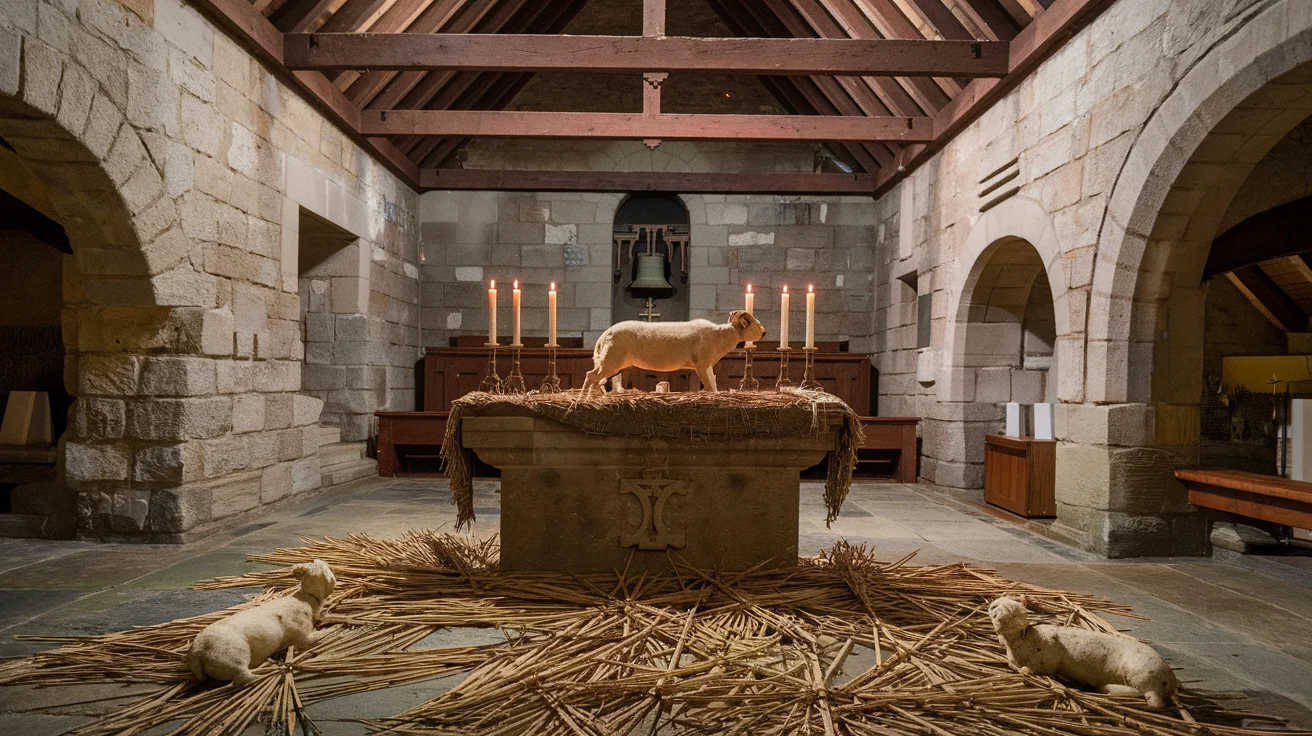Last Updated on October 22, 2024 by Ethan Richards
Animal sacrifice has long been a profound aspect of religious practice, with deep roots in ancient traditions. This blog post explores the journey of animal sacrifice from its origins in the Old Testament to its evolving role in modern Christianity.
We’ll delve into historical practices, theological implications, and contemporary perspectives, providing a comprehensive understanding of how sacrifice has shaped Christian beliefs and rituals.
The Old Testament Context: Origins of Animal Sacrifice
Animal sacrifice is an ancient practice with profound religious significance. In the Old Testament, sacrifices were a central component of worship and covenant rituals.
Historical Background
Animal sacrifice in the Old Testament can be traced back to early Hebrew traditions. These sacrifices were deeply embedded in the cultural and religious practices of the time. They often involved the offering of livestock, such as lambs, bulls, and goats, to God.
Biblical Foundations
Key passages in the Old Testament outline the practice of sacrifice:
- Genesis 4:3-4: The story of Cain and Abel, where Abel’s offering of a lamb was favored by God over Cain’s produce.
- Leviticus 1-7: Detailed instructions on various types of sacrifices, including burnt offerings, peace offerings, and sin offerings.
Purpose and Practice
Sacrifices were intended to achieve several purposes:
- Atonement: To atone for sins and seek forgiveness.
- Covenant: To establish and reaffirm covenants between God and His people.
- Communion: To express devotion and maintain a relationship with God.
The Problem: The Separation Between God and Humanity
In Christian theology, the concept of sacrifice addresses a profound issue: the separation between humanity and God caused by sin.
Concept of Atonement
Atonement refers to the process of reconciling humanity with God. In the Old Testament, sacrifices were believed to temporarily cover sins, yet they could not provide ultimate redemption.
Humanity’s Sin and Divine Separation
According to Christian belief, sin creates a barrier between humanity and God. This separation necessitates a means of reconciliation, which was initially addressed through animal sacrifices.
Role of Sacrifice
Animal sacrifices were seen as a way to bridge this gap. They symbolized the need for something valuable to be given in exchange for forgiveness and restored relationship with God.
The Significance of Animal Sacrifice in Christian Rituals
With the advent of Christianity, the role of animal sacrifice underwent significant changes.
Transition to Christianity
Early Christians inherited the Jewish tradition of sacrifice but began to reinterpret it in light of Jesus Christ’s teachings. The belief evolved from the necessity of animal sacrifices to the sufficiency of Christ’s ultimate sacrifice.
Evolving Rituals
In Christian practice, the ritual of animal sacrifice was replaced by symbolic acts:
- The Eucharist: Celebrates the Last Supper and symbolizes Christ’s sacrifice.
- The Lord’s Supper: A ritualistic meal that commemorates Jesus’ sacrifice, rather than a literal act of atonement.
Continuing Influence
Although animal sacrifices ceased, their influence persists in Christian symbols and rituals. The imagery of sacrifice remains central in understanding the significance of Jesus’ death and resurrection.
The Meaning of Animal Sacrifice in the Bible
Animal sacrifice is a recurring theme in the Bible, carrying deep symbolic meanings.
Symbolism
In biblical terms, animal sacrifices were not merely physical acts but carried spiritual significance:
- Purification: They symbolized the cleansing of sins.
- Redemption: They represented the cost of forgiveness and redemption.
Jesus Christ’s Sacrifice
Jesus is often described as the ultimate sacrifice:
- John 1:29: “Behold the Lamb of God, who takes away the sin of the world.”
- Hebrews 10:10: “We have been sanctified through the offering of the body of Jesus Christ once for all.”
New Testament Perspectives
The New Testament reframes the concept of sacrifice, focusing on Jesus’ death as the final and complete act of redemption. This shift signifies the end of the need for animal sacrifices, which were seen as temporary measures.
The Permanent Solution: Jesus Christ as the Ultimate Sacrifice
In Christian theology, Jesus Christ’s sacrifice is seen as the definitive solution to the problem of sin and separation from God.
Theological Significance
Jesus’ death is considered a once-for-all sacrifice that fulfills and surpasses the Old Testament practices. This belief is foundational to Christian doctrine and underscores the concept of Jesus as the ultimate redeemer.
Redemption and Salvation
Through His sacrifice, Jesus is believed to offer complete and eternal redemption:
- Romans 3:25: “God presented Christ as a sacrifice of atonement, through the shedding of his blood.”
- 1 Peter 2:24: “He himself bore our sins in his body on the cross.”
Scriptural Evidence
Key New Testament passages provide the basis for viewing Jesus’ sacrifice as the ultimate solution:
- Matthew 26:28: “This is my blood of the covenant, which is poured out for many for the forgiveness of sins.”
- Ephesians 1:7: “In him we have redemption through his blood, the forgiveness of sins.”
Animal Sacrifice Today: Reflection and Remembrance
Although animal sacrifices are not practiced in contemporary Christianity, their historical significance is acknowledged and reflected upon.
Historical Legacy
The legacy of animal sacrifice is studied and remembered as part of Christian history and tradition. It provides context for understanding the evolution of Christian practices.
Memorial Practices
Modern Christians may reflect on the history of sacrifice through:
- Educational Programs: Learning about the historical practices in religious education.
- Commemorative Events: Observing historical milestones related to sacrifice in church history.
Educational Aspects
Educational institutions and religious organizations often offer insights into the role of animal sacrifice in shaping Christian theology and practice.
Differences in Christian Perspectives on Animal Sacrifice
Christian perspectives on animal sacrifice vary widely among denominations and cultural contexts.
Denominational Views
Different Christian groups interpret the significance of sacrifice differently:
- Catholicism: Views the Eucharist as the continuation of Christ’s sacrifice in a symbolic form.
- Protestantism: Generally rejects literal sacrifice in favor of focusing on Jesus’ one-time atonement.
- Orthodoxy: Emphasizes the sacramental life and the continuing significance of Christ’s sacrifice in the liturgy.
Cultural and Theological Variations
Cultural contexts influence how various Christian communities view and incorporate the concept of sacrifice into their practices and beliefs.
Modern Adaptations
Contemporary Christianity often adapts the concept of sacrifice to align with modern values and practices, focusing on symbolic rather than literal interpretations.
Your next verse awaits—discover powerful Bible truths on our Home Page now or read more articles for deeper insights
Controversies and Debates Surrounding Animal Sacrifice in Christianity
Animal sacrifice, both historically and in contemporary discussions, has been a subject of significant controversy.
Ethical Concerns
Debates over the ethics of animal sacrifice often center on:
- Animal Rights: Concerns about the treatment of animals in religious contexts.
- Moral Implications: The relevance of sacrifice in modern ethical frameworks.
Theological Disagreements
Theological discussions include:
- Necessity: Whether the practice of sacrifice was necessary or whether its symbolic nature suffices.
- Continuity: The debate over whether modern rituals adequately replace historical practices.
Public and Scholarly Debates
Public discourse and academic studies frequently address the impact and relevance of animal sacrifice, contributing to ongoing debates within the Christian community.
The Influence of Cultural Context on Animal Sacrifice in Christianity
Cultural context plays a crucial role in shaping the understanding and practice of animal sacrifice within Christianity.
Historical Influence
Cultural and historical factors influenced how animal sacrifice was practiced and perceived. The integration of animal sacrifice into Christian rituals reflects the broader cultural milieu.
Global Perspectives
Different cultures interpret and adapt the concept of sacrifice in various ways:
- Western Christianity: Generally focuses on symbolic interpretations.
- Eastern Christianity: May incorporate traditional elements with modern adaptations.
Modern Implications
The impact of cultural diversity is evident in how contemporary Christian communities address and reflect on the historical practice of sacrifice.
Animal Sacrifice and the Christian Message of Love and Forgiveness
The concept of sacrifice is intricately connected to the Christian message of love and forgiveness.
Integrative Analysis
Sacrifice in Christianity is seen as a means of expressing divine love and facilitating forgiveness:
- John 3:16: “For God so loved the world that he gave his one and only Son.”
- Romans 5:8: “But God demonstrates his own love for us in this: While we were still sinners, Christ died for us.”
Theological Reflections
The transition from animal sacrifice to Christ’s sacrifice represents a shift towards understanding forgiveness and love as central tenets of Christian faith.
Practical Implications
This message influences Christian practices and beliefs, shaping how adherents understand and live out their faith.
Conclusion
Understanding the role of animal sacrifice in Christianity provides valuable insights into the evolution of religious practices and theological beliefs. From its Old Testament origins to its reinterpretation in modern Christianity, the concept of sacrifice reflects profound changes in how humanity relates to the divine. Reflecting on this journey offers a deeper appreciation of Christian traditions and their significance in today’s world.

Justin Taylor is a gifted storyteller and dream analyst who brings a fresh perspective to biblical dream interpretations. His engaging narratives and intuitive insights captivate readers, guiding them through the intricate tapestry of their subconscious mind.










